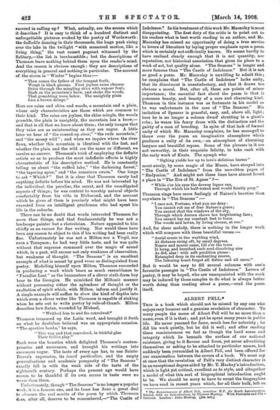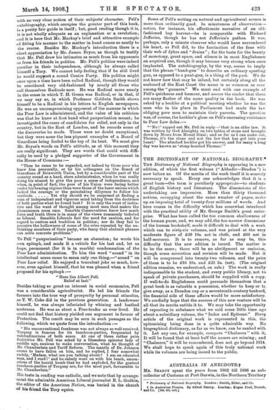ALBERT PELL.•
THIS is a book which should not be missed by any one who- enjoys racy humour and a genuine revelation of character. To. many people the name of Albert Pell will be no more than name, even if it is that ; and yet he spent many years in public- life. He never yearned for fame, much less for notoriety ; he did his work quietly, but he did it well; and after reading- these reminiscences we feel as though the hard sense and. integrity which lie beneath the surface of our national existence, giving to it flavour and force, yet never advertising themselves or asking to be attached to particular names, had suddenly been personified in Albert Pell, and been offered for" our examination between the covers of a book. We must say at once that the revelation of Pell's very distinct character is-. in an exceptional degree aided by Mr. T. Mackay's introduction, which is light yet critical, excellent as to style, and altogether a model of what this sort of biographical introduction ought to be. We should be sorry to have to count the biographies, we have read in recent years which, for all their bulk, left us .
• The Reminiscences of Albert Pell, sometime M.P. for South Leicestershire. Edited, with an Introduction, by Thomas Mackay. With Portraits and trefoils. London : John Murray. [ms. net.] with no very clear notion of their subjects' character. Pell's autobiography, which occupies the greater part of this book, is a pretty fair guide in itself ; but, good reading though it is, it is not wholly adequate as an explanation or a revelation; and it is here that Mr. Mackay's brief and attractive example of fitting his manner to the matter in hand comes so neatly to the rescue. Besides Mr. Mackay's introduction there is a short appreciation by Mr. James Bryce, as though to testify that Mr. Pell drew his intimates as much from his opponents as from his friends in politics. Mr. Pell's politics were indeed peculiar in their independence, although he always called -himself a Tory. We cannot help feeling that if he still lived he would support a sound Centre Party. His politics might once upon a time have been called Radical, though they would be considered very old-fashioned by nearly all those who call themselves Radicals now. He was Radical more nearly in the sense in which T. H. Green was Radical, or in that, if we may say so, in which Professor Goldwin Smith shows himself to be a Radical in his letters to English newspapers. He was an uncompromising opponent of the manner in which the Poor Law is administered, and the value of his criticism was that he knew at first hand what pauperisation meant; he investigated the cases of candidates for relief, not only in the country, but in the East of London, and he records some of the discoveries he made. These were no doubt exceptional, but they were none the less piquant examples of a Board of Guardians being fooled to the top of its bent. We must give Mr. Bryce's words on Pell's attitude, as at this moment they are really significant. They are words that could with diffi- culty be used by a pledged supporter of the Government in the House of Commons :- "Thus he came to be regarded, not indeed by those poor who knew him personally, or by his colleagues on the Board of Guardians of Brixworth Union, but by a considerable part of the country round as a hard, stern administrator, when he was really -doing his utmost to give the poor a sense of independence, and ,when, in point of fact, the poor of his Union were faring better under his bracing regime than were those of the laser unions which lacked the courage or the painstaking diligence to follow his methods Yet why should we be surprised at finding a man of independent and vigorous mind taking from the doctrines ,of both parties what he found best ? It is only the want of initia- tive and the want of thought among most men that makes the phenomenon seem rare. Sensible Conservatives know how much lows and truth there is in many of the views commonly ticketed as Liberal. Sensible Liberals feel the need for caution, and for :regard to custom and tradition in politics ; nor do they fail to perceive the hollowness of some of the cries repeated by the un- thinking members of their party, who fancy that abstract phrases can solve concrete problems."
To Pell "pauperisation" became an obsession; he wrote his .own epitaph, and made it a vehicle for his last and, let us hope, permanent (for it is in marble) condemnation of the Poor Law administration. To him the word " sound " in its 'intellectual sense came to mean only one thing.—" sound " on Poor Law relief. He enjoyed a truculent joke so much, how- -ever, even against himself, that he was pleased when a friend proposed for his epitaph :— " Here lies Albert Pell. Relief at last."
Besides taking so great an interest in social economics, Pell 'was a considerable agriculturist. He led his friends the 'farmers into the true way of prosperity by personal stimulus, as T. W. Coke did in the previous generation. A landowner himself, he was always infuriated by whining and loathed mostrums. He was as stout a Free-trader as ever lived. He .could not find that history yielded one argument in favour of Protection. The result may be seen in such passages as the 'following, which we quote from the introduction :- " His unconventional frankness was not always so well received. 'Torquay is famous for its luncheon-parties, frequented by -valetudinarians of both sexes. At one of these rather prim festivities Mr. Pell was asked by a blameless spinster lady of uniddle age, anxious to make conversation, what he thought of Mr. Chamberlain and Tariff Reform. The mantle of Dr. Johnson .seems to have fallen on him, and he replied, I fear somewhat rudely, ' Madam, what are you talking about ? I am an educated man, and I read!' and he calmly went on with his lunch, uncon- scious of the horrid bomb that he had exploded, for the genteel luncheon-parties of Torquay are, for the most part, favourable to ,Mr. Chamberlain."
His taste in reading was catholic, and we note that by arrange- anent the admirable American Liberal journalist E. L. Godkin, .the editor of the American Nation, was buried in the church of his friend the Tory squire. Some of Pell's writing on natural and agricultural scenes is more than ordinarily good. In minuteness of observation— notice, for instance, his affectionate narrative of an old-
fashioned hay harvest—he is comparable with Richard Jefferies, though he has not Jefferies's pathos. It was, perhaps, only a minute observer who would have surrendered his heart, as Pell did, to the fascination of the fens with their web of dykes and " drains" ; for the taste for the beauty of monotony, great space, and silence is in most Englishmen an acquired one, though it may become very strong when once implanted. The autobiography, by the way, seems to imply
that the phrase "hand-gun" to 'describe an ordinary sporting gun, as opposed to a punt-gun, is a thing of the past. We do not know how that may be inland, but certainly along all the seaboard of the East Coast the name is as common as ever among the " gunners." We must end with one example of Pell's quickness and humour, and assure the reader that there are many flashes of the same quality in the book. He was
asked by a heckler at a political meeting whether he was the man who in his place in Parliament had made the law obliging poor men to maintain their parents. The question was, of course, the heckler's gloss on Pell's unceasing resistance to Poor Law doles :—
"'No I ' rapped out Mr. Pell in reply—'that is an older law. It was written by God Almighty on two tables of stone and brought down by Moses from Mount Sinai; and as far as I can make out, Thomas, it's the stone and not the law that has got into your heart.' The abashed heckler got his answer, and for many a long day was known as stony-hearted Thomas.' "











































 Previous page
Previous page